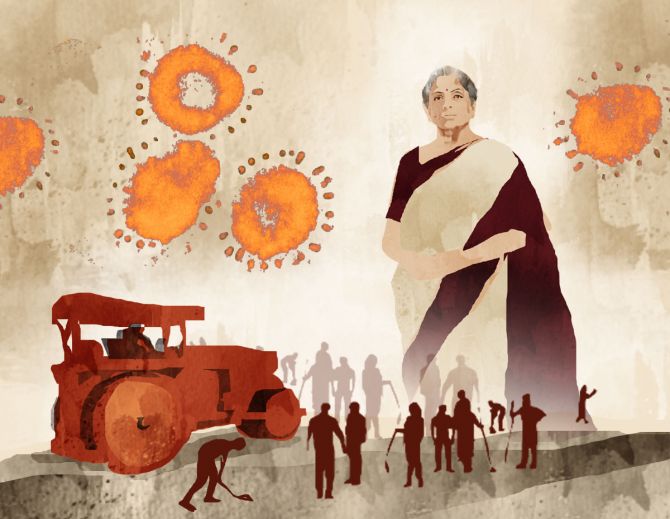'Government's focus should be on the expenditure side in this Budget, not so much on the taxation side.'

As the Budget is days away, former chief statistician Pronab Sen tells Indivjal Dhasmana/Business Standard, "If the government cuts the peak personal income tax rate, leaving other things unchanged, it will be accused of favouring the rich. This would be very difficult to sell politically."
With economic growth slowly recovering, should the Budget focus on continuing government capex, or private investment has revived now?
Private investment is in the process of reviving. It is almost certain that investment by the corporate sector has revived.
There is strong corporate-sector growth.
However, revival in capex in the non-corporate sector, which is our MSME sector, is beginning now.
It has only been three-four months since it started. That would require continued support.
In this regard, should the government go for fiscal consolidation in this Budget in line with the path given in the 2022-2023 Budget, which wants the deficit to come down to below 4.5 per cent of GDP in 2024-2025 from the expected 6.4 per cent this fiscal year?
I don't think 4.5 per cent should be taken as carved in stone. This requires a cut in the fiscal deficit by 1 per cent of GDP every year.
That is a very substantial amount.
I think the glide path downward should continue but it should not be in such large chunks.
Maybe going from 6.4 per cent to 5.75-5.8 per cent should be targeted for next fiscal year.
India Inc and economists have suggested to Finance Minister Nirmala Sitharaman cutting personal income tax rates to put more disposable income in the hands of the people. What is your take on that?
I don't think there is any compelling need to cut personal income-tax rates.
The recent GDP data suggests that consumption grew 9.5 per cent in the second quarter of FY23.
This should support GDP growth of above 7 per cent if investment plays along.
That is one side of the story.
The other side tells us that companies are paying the corporate rate, which is about 23 per cent, but individuals are paying personal income tax rates, which peak at 42 per cent.
That puts the non-corporate sector at a disadvantageous position relative to the corporate sector.
There is a need to level that playing field.
But if the government cuts the peak personal income tax rate, leaving other things unchanged, it will be accused of favouring the rich.
This would be very difficult to sell politically.
Will cutting the peak personal income tax rate be a correct move, given that Covid has widened income disparities?
That would be a wrong move.
So, should the peak rate be cut or not?
At the moment, there is no need to fiddle around with the income-tax rates.
The government should not do much on the tax side.
It may want to raise rates on customs duties because we are going to face a threat from imports, with the global economy softening.
So, the government may want to give a bit of push to Indian producers.
I think the government's focus should be on the expenditure side in this Budget, not so much on the taxation side.
Expenditure on the capex side or revenue side?
Both. The damage from Covid continues for a lot of poorer categories of people. Continuing the support the government has given is not a bad thing to do.
The government has increased its capex. I think it is on track.
That process should continue. However, you should be very clear about the kind of capex required.
There is a big difference between building a super highway and building a rural road.
Super highways are built by very large companies, using mechanised construction technologies.
Rural roads are built by local contractors, using labour-intensive technologies.
Given the kind of income disparities, it is the rural road type of capex the government should be pushing.
Does it also mean that more money should be allocated to schemes like MGNREGA?
Almost certainly. Reports from the field are very clear that the demand under the MGNREGA far exceeds the ability of state governments to provide work.
States are laying the entire blame on the Centre and are saying that the latter is not giving them enough funds, whereas the Centre is turning around, saying that the states do not have enough projects.
This is a fruitless fight.
The fact of the matter is that the people who went back to villages in 2020 and 2021 are still there and they don't have work.
Villages already had excess workers. MGNREGA may be the only instrument that keeps them occupied.
But there is distress in urban areas too and there have been suggestions to launch an MGNREGA-like scheme for these areas. Should the Budget try that?
A reason why such a scheme has not happened in urban areas is that while it was talked about, the problem was designing it.
We don't have a really workable blueprint.
It would be counter-productive for the government to launch such a scheme in a hurry in the absence of such a blueprint.












 © 2025
© 2025